At the start of our tour of Telouet schools, we stop for a breakfast break. We three visitors (and later, the teacher Lahcen) traipse across the road to have some tea with a man I take to be the director of the school; Ahmed describes him as the chief of the village.
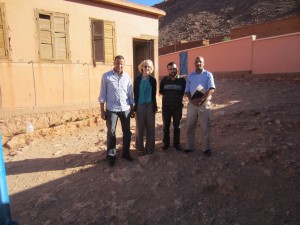
Tea turns out to be more elaborate than I had anticipated. The house is traditional pisé architecture (“Take a photo of the roof,” Ahmed and Hassan urge me: the traditional beams are palm trunks).
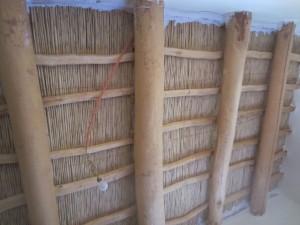
Our host, El Basheer, vanishes briefly; a woman greets us shyly then vanishes as well. When El Basheer returns, he brings with him traditional hand-washing equipment: Ahmed picks up the soap and washes his hands over the basin while El Basheer pours the warm water. We all take turns. Once you’ve washed and dried your hands, you pour for the person next to you in line; soap waits on the edge of the container catching the water.
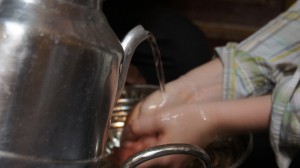
Then comes the sweet tea, along with four loaves of fresh, hot bread, with honey and butter and olive oil and olives. The bread is particularly good—warm, thick, light, and crusty—but it’s all delicious, and we give it our full attention. I worry briefly that if each school visit is going to include this kind of food, I may not be able to keep up.
The Tamazight-and-Darija conversation washes over me, with periodic breaks for translation into French, mostly by Ahmed. We canvass my appearance as an American, and the three men discuss previous American NGOs active in the area, along with the much greater French activity at present. The obligatory family inquiries turn up an interesting detail: El Basheer’s nephew is going to university for Islamic studies, something of a scandal because El Basheer himself is an old lefty, a member of the Istiqlal (the nationalist party). El Basheer smiles at me: “I just can’t understand it!” That younger generation…” By process of association, conversation shifts to the city of Kelaa-M’Gouna, where Hassan is now inspector of schools. Kelaa-M’Gouna is known for its political polarization: it sends half of its graduates to university in Islamic studies, the other half to university for Amazigh or Berber studies. How do these opposites co-exist in one city?
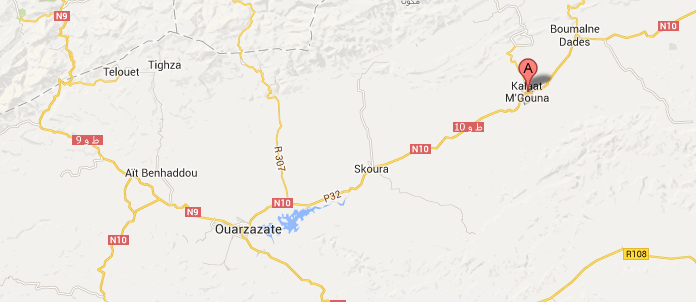 Then the conversation turns to a recent announcement from the local minister of education: all female teachers will be assigned to schools in Ouarzazate itself; all male teachers will be sent out to the small villages. It’s a potentially gallant gesture, saving young women from harsh living conditions: no electricity or running water in some places. But no one thinks the announcement is a good idea. What happened to equality? “Il est fou!” El Basheer sums up for my benefit. The minister of education is crazy! “It would have been simple to achieve the same effect without making such a stupid announcement. Now he’s got everyone’s back up.”
Then the conversation turns to a recent announcement from the local minister of education: all female teachers will be assigned to schools in Ouarzazate itself; all male teachers will be sent out to the small villages. It’s a potentially gallant gesture, saving young women from harsh living conditions: no electricity or running water in some places. But no one thinks the announcement is a good idea. What happened to equality? “Il est fou!” El Basheer sums up for my benefit. The minister of education is crazy! “It would have been simple to achieve the same effect without making such a stupid announcement. Now he’s got everyone’s back up.”
As we walk back out to the car, I thank El Basheer for his hospitality and mention in passing Ahmed’s remark that El Basheer is the chief of the village. I mean only to extend the compliment. But El Basheer takes issue—serious issue—with this statement: “I am not the chief! I am an elected official—un élué. A chief is something from the past. I am elected, elected! I am no different from any other member of the village.”
OK, I get it: I’ve made a post-colonial blunder. I seem politically naïve. “You want me to know you’re not like the Glaoui.”
“No! I’m an elected official. Elected. A chief is for life.”
I try to shift the focus a little by asking about the size and composition of the village. There are five families in the village—founding families, some of whom live further out now—and each of these five families sends a representative to a kind of village council. Total population: roughly 475 people. (Those are big families, I think to myself: multiple generations.)
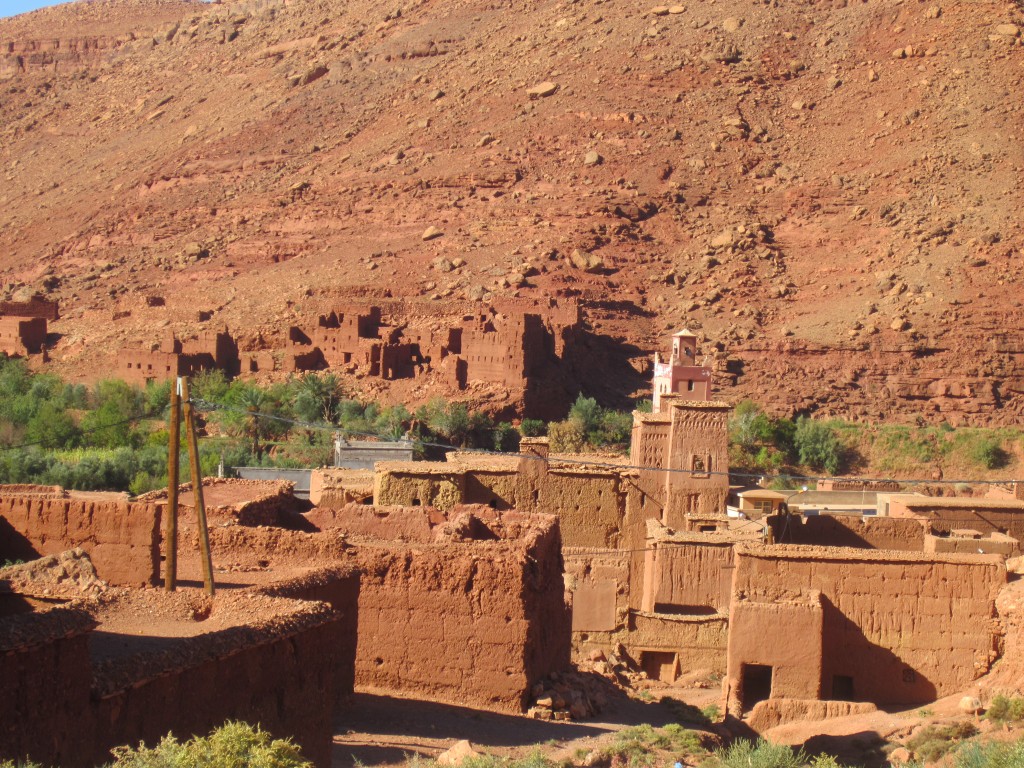
There are disputes about land and sometimes about other resources, but most of these are easily resolved. As we drill down into the details, El Basheer tries to clarify for me: this is l’aazerf, the ancient, oral tradition of governance. It underlies the rule of law, and it rests a little uneasily under the government and the structure of modern law. The government accepts it, because it serves the interests of the government in resolving local conflicts and issues, but l’aazerf is neither the modern government nor the law.
Hassan and Ahmed are waiting for me by the car; we all say our goodbyes and then the three of us drive off.
“He didn’t like it when I called him the chief,” I say, partly to explain the length of the conversation I’d been having.
Ahmed smiles. “Nonetheless, El Basheer is the chief.” I look back at him in surprise. “Absolutely. Every person in that village would move the entire village a mile up or downriver at a gesture from his little finger.”
“He wanted me to know he was an elected official, not a chief.”
Ahmed’s smile deepens. “Oh, yes, he’s elected. He didn’t want to run for office, so each of the families in the village sent a representative to ask—or really to insist—that he accept the role. The elected chief.”
We turn a sharp corner to find a large truck barreling at us and conversation halts as Hassan slams on the breaks. The car stalls. We take a communal breath.
“I was protecting the car,” Hassan explains with a grin, starting up again.
“Thank you!”
“He was scared,” teases Ahmed from the backseat.
“I was scared too!”
“But not me,” says Ahmed, “because I’m further back.”